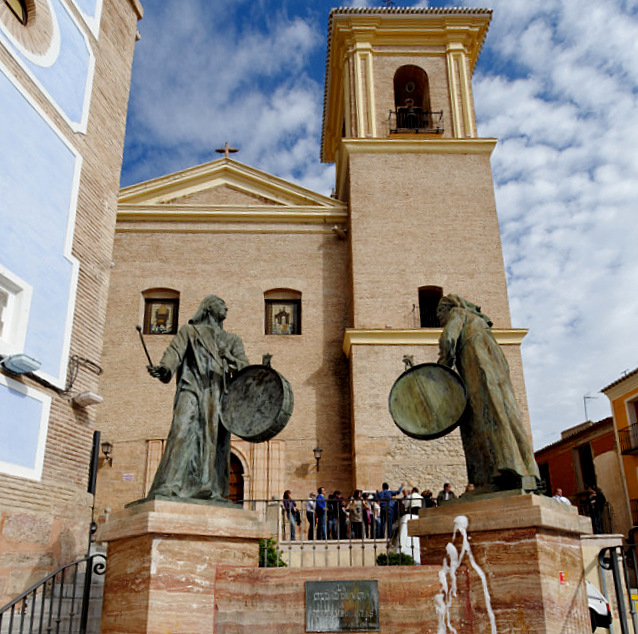- Region
- Águilas
- Alhama de Murcia
- Jumilla
- Lorca
- Los Alcázares
- Mazarrón
- San Javier
-
ALL AREAS & TOWNS
- AREAS
- SOUTH WEST
- MAR MENOR
- MURCIA CITY & CENTRAL
- NORTH & NORTH WEST
- TOWNS
- Abanilla
- Abarán
- Aguilas
- Alamillo
- Alcantarilla
- Aledo
- Alhama de Murcia
- Archena
- Balsicas
- Blanca
- Bolnuevo
- Bullas
- Cañadas del Romero
- Cabo de Palos
- Calasparra
- Camping Bolnuevo
- Campo De Ricote
- Camposol
- Canada De La Lena
- Caravaca de la Cruz
- Cartagena
- Cehegin
- Ceuti
- Cieza
- Condado de Alhama
- Corvera
- Costa Cálida
- Cuevas De Almanzora
- Cuevas de Reyllo
- El Carmoli
- El Mojon
- El Molino (Puerto Lumbreras)
- El Pareton / Cantareros
- El Raso
- El Valle Golf Resort
- Fortuna
- Fuente Alamo
- Hacienda del Alamo Golf Resort
- Hacienda Riquelme Golf Resort
- Isla Plana
- Islas Menores & Mar de Cristal
- Jumilla
- La Azohia
- La Charca
- La Manga Club
- La Manga del Mar Menor
- La Pinilla
- La Puebla
- La Torre
- La Torre Golf Resort
- La Unión
- Las Palas
- Las Ramblas
- Las Ramblas Golf
- Las Torres de Cotillas
- Leiva
- Librilla
- Lo Pagan
- Lo Santiago
- Lorca
- Lorquí
- Los Alcázares
- Los Balcones
- Los Belones
- Los Canovas
- Los Nietos
- Los Perez (Tallante)
- Los Urrutias
- Los Ventorrillos
- Mar De Cristal
- Mar Menor
- Mar Menor Golf Resort
- Mazarrón
- Mazarrón Country Club
- Molina de Segura
- Moratalla
- Mula
- Murcia City
- Murcia Property
- Pareton
- Peraleja Golf Resort
- Perin
- Pilar de la Horadada
- Pinar de Campoverde
- Pinoso
- Playa Honda
- Playa Honda / Playa Paraíso
- Pliego
- Portmán
- Pozo Estrecho
- Puerto de Mazarrón
- Puerto Lumbreras
- Puntas De Calnegre
- Region of Murcia
- Ricote
- Roda Golf Resort
- Roldan
- Roldan and Lo Ferro
- San Javier
- San Pedro del Pinatar
- Santiago de la Ribera
- Sierra Espuña
- Sucina
- Tallante
- Terrazas de la Torre Golf Resort
- Torre Pacheco
- Totana
- What's On Weekly Bulletin
- Yecla


- EDITIONS:
 Spanish News Today
Spanish News Today
 Alicante Today
Alicante Today
 Andalucia Today
Andalucia Today
The church of San Miguel Arcángel in Mula
San Miguel Arcángel is the main parish church of Mula
The Iglesia de San Miguel Arcángel (the church of Saint Michael the Archangel) is the main parish church of Mula and is located in the urban centre of the town in Plaza Mayor and opposite the Town Hall, accessed via Calle Boticas, la Cuesta del Caño or Calle de San Miguel.
This is the home of the statue of the patron saint of the town and contains his relics as well as an impressive crypt below the floor.
A visit to the church comprises both the main building itself, and the small museum of art of San Miguel, which adjoins the church itself and houses a collection of religious paintings donated by an important local family.
The church has a simple structure in a Latin cross, with a central nave and three chapels on either side, crowned by a small domed "templete" above the main altar in which the figure of San Miguel appears, with Lucifer lying defeated at his feet.
History of the church of San Miguel Arcángel
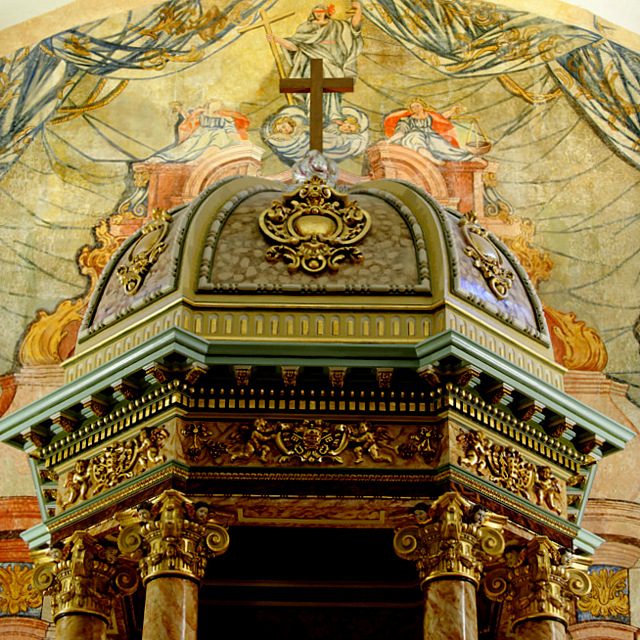 13th century
13th century
The foundation of the church of San Miguel dates back to the days of the Reconquista in 1243, when young prince Alfonso of Castile, later to become King Alfonso X, El Sabio, entered the fortified Moorish settlement of Mula, bringing Christianity to a Muslim kingdom.
He created two parish churches, San Miguel and Santo Domingo, it being likely that the first was in the location of the current church dedicated to the Virgen del Carmen on the perimeter of the old Moorish wall in the north of the town.
15th and 16th centuries
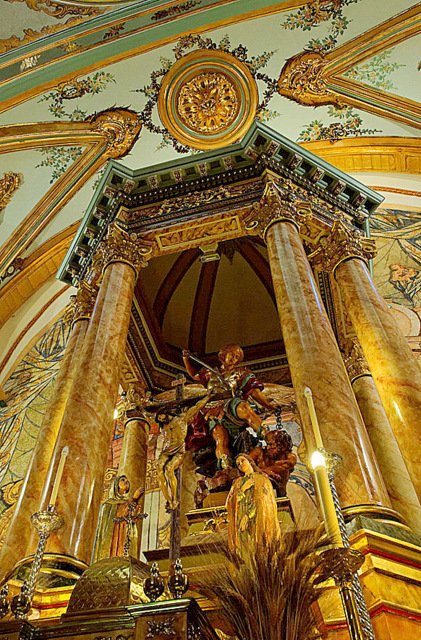 In 1430 Mula was placed in the hands of Alfonso Yáñez Fajardo II, of the ambitious and increasingly powerful Fajardo family who became the Marqueses de los Veléz in 1507, making Mula the seat of their administration. At this time, Mula had around 1,000 inhabitants.
In 1430 Mula was placed in the hands of Alfonso Yáñez Fajardo II, of the ambitious and increasingly powerful Fajardo family who became the Marqueses de los Veléz in 1507, making Mula the seat of their administration. At this time, Mula had around 1,000 inhabitants.
The town expanded and became wealthier and in 1560 the Veléz family set about constructing the existing church in its present location. Although it was subsequently amplified and modified, the core elements of the structure date from this period, and inside visitors can view the family funeral chapel of the 5th Marqués de los Veléz: a glass floor has been placed above the family crypt, which can be illuminated by dropping a coin in a box. This whole chapel has recently been restored.
17th century
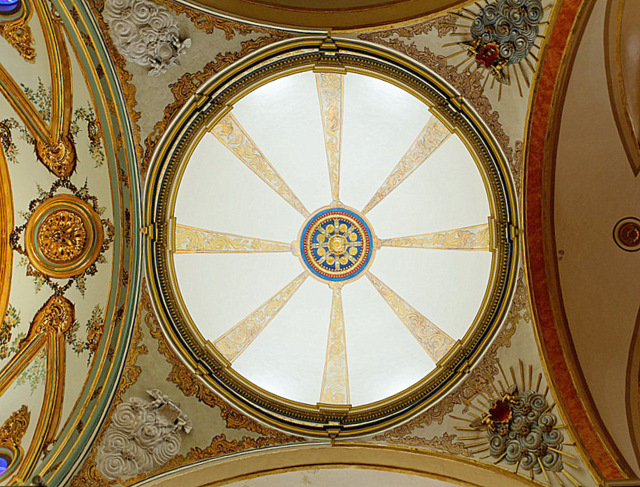 In 1618 the southern door was altered and a plaque situated in the façade says that the church was amplified and completed during the reign of Felipe III, with the work paid for by Luis Fajardo, although it was again remodelled at the end of the 17th century. The belltower dates from 1638.
In 1618 the southern door was altered and a plaque situated in the façade says that the church was amplified and completed during the reign of Felipe III, with the work paid for by Luis Fajardo, although it was again remodelled at the end of the 17th century. The belltower dates from 1638.
The baroque panelling which characterises the church and the wrought iron work on the pulpit are by Lorenzo del Campo and Francisco Sanchez Ortiz and date from this period.
18th and 19th century
The western door is the main entrance and has a Cehegín marble surround. It was built at the beginning of the 18th century along with the steps which lead down into the square below.
20th Century
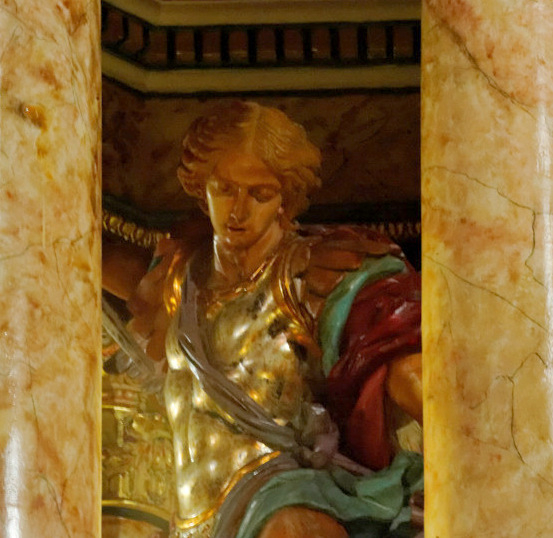 Along with many other churches throughout the Region of Murcia, the church and the works of art it contained, suffered significant damage during the Civil War.
Along with many other churches throughout the Region of Murcia, the church and the works of art it contained, suffered significant damage during the Civil War.
The main artworks and sculptures all date from the subsequent remodelling: the altars of the side chapels are dedicated to Our Lady of Sorrows (the Virgen de Dolores) by Jose Sanchez Lozano, (1940,) with a recumbent Christ, and altarpiece by Juan Manuel Carrillo Marco (1940). The altarpiece of San Felipe and images of the Martyr were completed in 1943 by Don Vicente Benedito.
The figure of San Miguel Arcángel was completed in 1942 by Vicente Benedito, and is above the "Cámara Santa", which contains an eclectic collection of items donated to and collected by the church. These includ ea reproduction of the figure of the Virgen de la Arrixaca which was brought to Murcia by Alfonso X in 1243: she was formerly the patron of the city of Murcia before being supplanted by the Virgen de la Fuensanta.
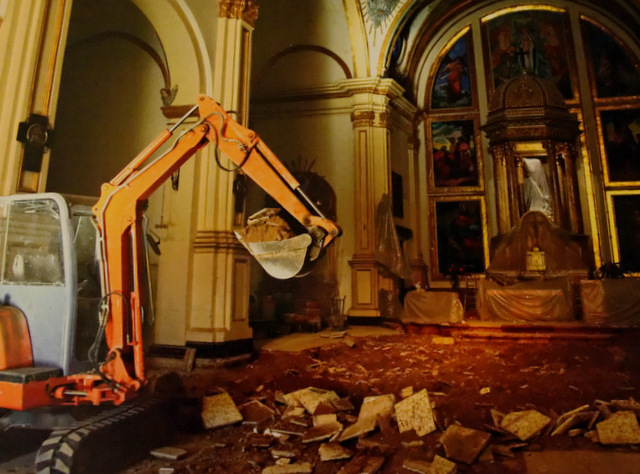 This is next to the "templete", which contains the image of San Miguel, and from here visitors can descend by a staircase to an underground area. The illumination of this area was the idea of a priest named Esteban Monreal, who was imprisoned in the church of San Juan Bautista in Murcia during the Civil War.
This is next to the "templete", which contains the image of San Miguel, and from here visitors can descend by a staircase to an underground area. The illumination of this area was the idea of a priest named Esteban Monreal, who was imprisoned in the church of San Juan Bautista in Murcia during the Civil War.
This area holds a number of interesting photographs showing the restoration works which were carried out after the Civil War.
Location
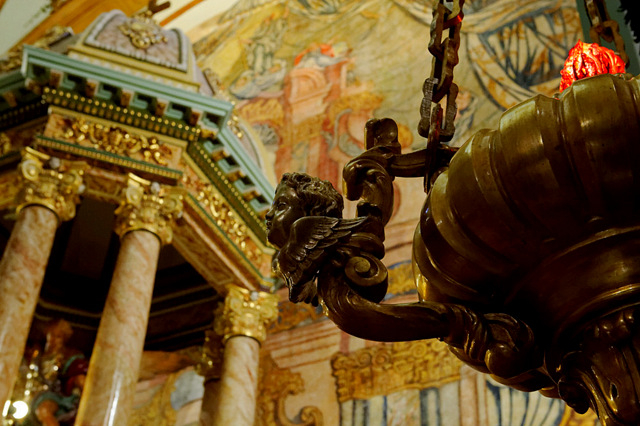 The church is located in Calle San Miguel, off the Plaza del Ayuntamiento
The church is located in Calle San Miguel, off the Plaza del Ayuntamiento
Click for map, Calle San Miguel, Mula
The church is normally open for visits between 11.30am and 1.30pm .
Tel : 606 459076
Its advisable to check with the tourist office if planning to bring a group to visit, Tel 968 661501.
Parking near the church can be a bit of a challenge, as can any parking in the streets of the old quarter of Mula. The most sensible option is to leave the car down by the Glorieta Juan Carlos I and then walk up the hill. This is a good place to stop off afterwards for a coffee or tapas after exploring the old quarter.
MUSEO DE ARTE de SAN MIGUEL ARCÁNGEL in Mula
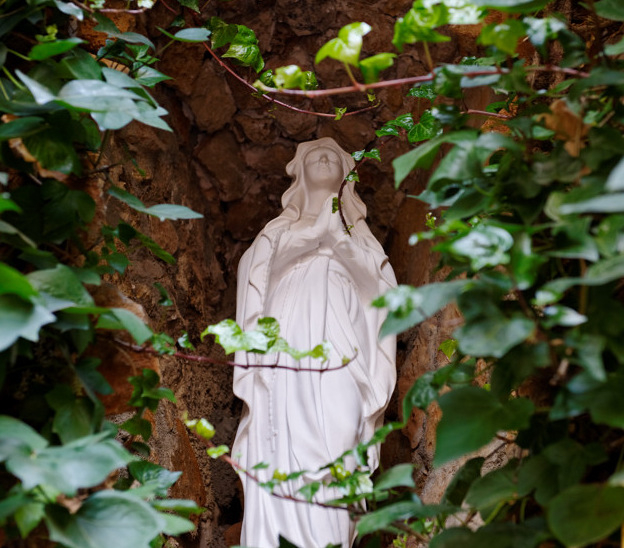 Right next to the church is the Museo de Arte de San Miguel, which holds a collection of religious artworks donated by Pedro Luis Blaya and Pilar de la Canal in 1942.
Right next to the church is the Museo de Arte de San Miguel, which holds a collection of religious artworks donated by Pedro Luis Blaya and Pilar de la Canal in 1942.
It has a small collection of echibits dating from the 16th to 20th centuries, including some interesting pieces painted on glass, and is worth visiting as part of an excursion to the church itself.
Click for map, Calle del San Miguel, Plaza del Ayuntamiento.

